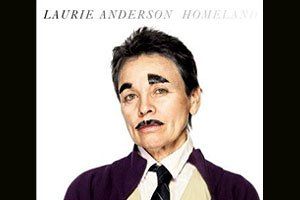
"I am pretty angry," says Laurie Anderson. She had just returned home to New York after a trip to Australia where she and husband Lou Reed curated a multiweek arts festival. On Homeland, her first studio album in 10 years, her anger is perceptible and pervasive. It emerged from a stage piece Anderson began crafting in the latter half of the George W. Bush years. "I was walking around thinking that my identity didn't depend on what I think of the United States. But then, in some way it kind of does. The torture at Abu Ghraib really hit me. My sense of being an American depended on thinking we didn't do stuff like that. So I wrote a lot of things about that. And then as we sort of segued into the Obama [presidency], I thought: I'm going to see what would happen if we just started again in this way. But it's even darker today, with the [financial collapse] and pelicans dragging themselves out of the gulf. It's beyond heartbreaking for everyone. If I started writing this now, it would be even angrier."
Laurie Anderson hasn't built her career from the clay of outrage. She hasn't even built it up by seeming to be of a single mind. On some of her works, she switches back and forth between her natural voice to an electronically manipulated male alter ego (that's her in character above) and she can collaborate easily with Peter Gabriel or William Burroughs. Anderson has long made her own fun by drifting with ease between disparate personae. After starting out as a sometimes-visual, sometimes-performance artist, Anderson stumbled accidentally into a major-label recording career once the famous BBC DJ John Peel promoted her first single, "O Superman"—an eight-minute vamp patterned after a Massenet aria—back in 1981. As befits someone with a career so indebted to randomness, Anderson has tended to sound bemused by all aspects of the world—even its drawbacks.
That's different now. On Homeland, she's quite specific about what's wrong with the world, even if she's not prescriptive about what should change. The closest thing to a single on the record is the seven-minute "Only an Expert," which dumps a truckload of disdain on our (presumptive) best and brightest who gave us the financial collapse, state-sponsored torture, and the media's faux-outrage scandals. Over a danceable beat created in part by Kieren Hebden (otherwise known as Four Tet, a DJ beloved by the indie-rock set), "Only an Expert" lands its hardest blow with this dark-humored verse:
"Now sometimes experts lend you money / and sometimes they lend you lots of money / and sometimes when the subprime mortgages collapse / and banks close and businesses fail / and the crisis spreads around the world / sometimes other experts say: / Just because all the markets crashed, doesn't mean it's necessarily a bad thing / and other experts say: / Just because all your friends are fired, and your family's broke, and we didn't see it coming doesn't mean / that we were wrong. / And just because you lost your job, and your house, and all your savings / doesn't mean that you don't have to pay for the bailouts / for the traders / and bankers and the speculators. / 'Cause only an expert can design a bailout / and only an expert can expect / a bailout."
(You can watch an early version of the song below.)
The good news is that Anderson's newfound sense of polemic hasn't poisoned her minimalist sensibility for arranging her music. You could imagine a pissed-off Anderson overloading the mixing board with whirring, whizzing electronics to go with her stressed-out state of mind, but Homeland has an appealing amount of restraint to it. Even when all-star collaborators like John Zorn or Antony Hegarty pile on, their contributions register as mere whispers in the background. (Zorn's squealing alto-saxophone bleats have never seemed as delicate as they do on Homeland. And if you give the album a distracted listen, you may miss Hegarty's gentle vocals entirely, since they hover rather low in the mix.)
According to Anderson, though, the most important collaborator on Homeland was her husband—who entered the studio and told her when she was finished tweaking a track and needed to move on. Besides suggesting some of the musicians who crop up on Homeland, Reed also named that long-anonymous male alter ego of hers. "Lou said, 'This guy needs a name: how about Fenway Bergamot?' It's cool because it suggests both a baseball stadium, as well as Proust's madeleine." It might sound a bit like a putdown to suggest that only a record-producing expert like Reed could get Anderson back on the album assembly line after a long hiatus, but the singer will tell you that herself. "I'd still be in the studio with my thousands of audio files if it weren't for him," she said. Mark that down as one problem solved, at least.
Uncommon Knowledge
Newsweek is committed to challenging conventional wisdom and finding connections in the search for common ground.
Newsweek is committed to challenging conventional wisdom and finding connections in the search for common ground.





